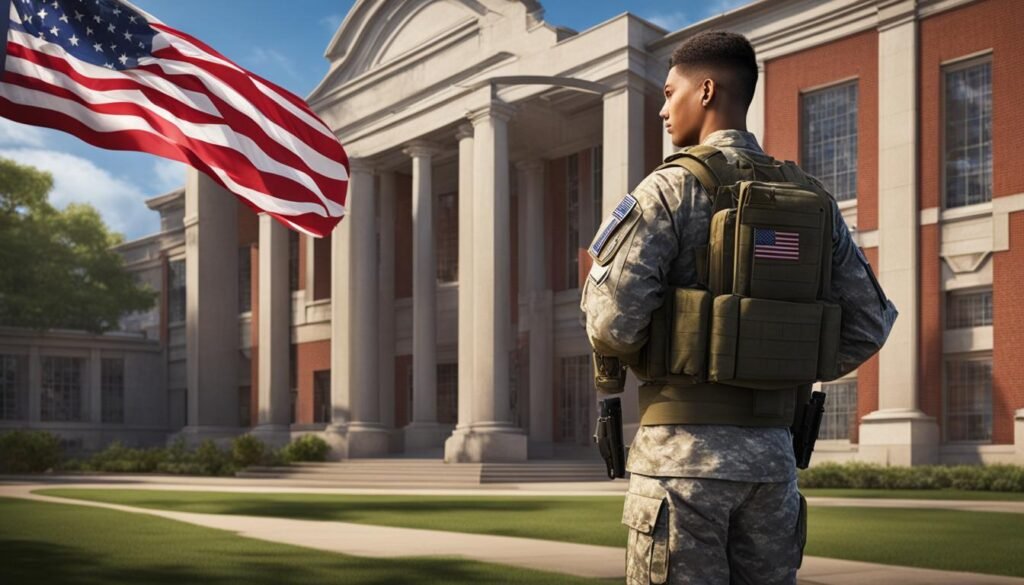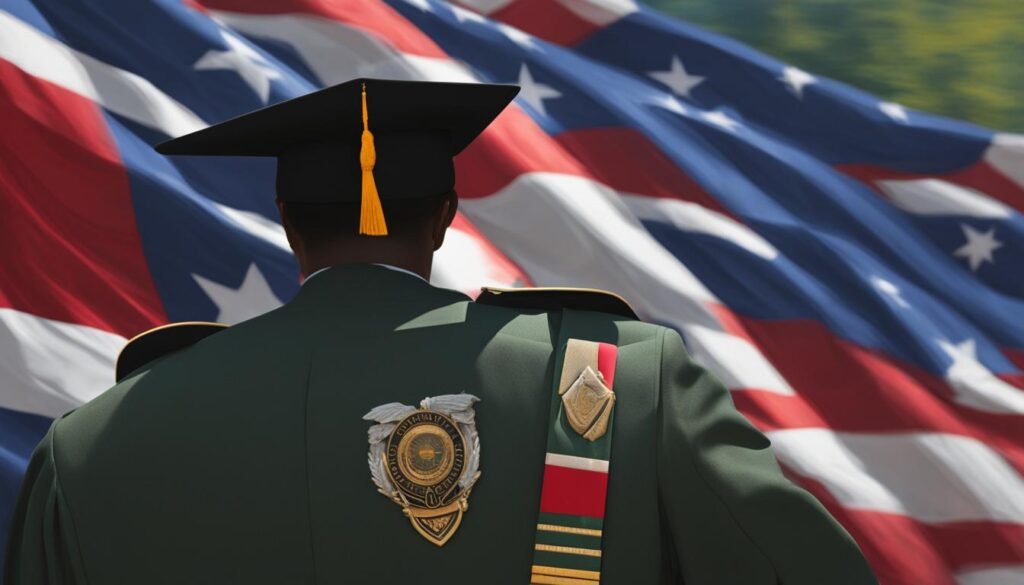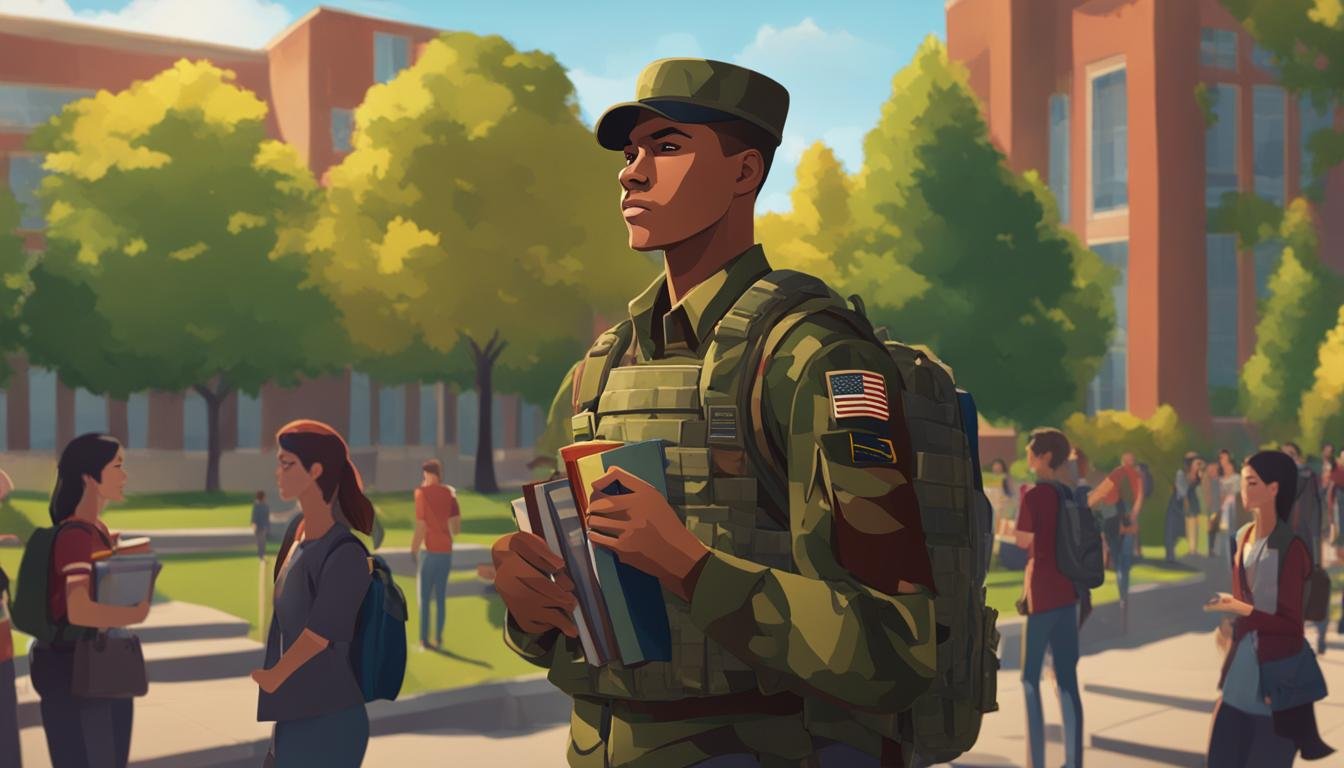Your military experience can be a valuable asset when it comes to pursuing higher education. Many colleges and universities recognize the skills and training you gained during your service and offer college credit for military experience. This article will explore how you can leverage your military background to enhance your college applications and succeed in your academic journey.
- Colleges and universities offer college credit for military experience, recognizing the skills and training gained during service.
- The American Council on Education (ACE) collaborates with the Department of Defense (DoD) to review military training and recommend appropriate college credit.
- Your military experience has prepared you for the challenges of college, including discipline, perseverance, adaptability, leadership, teamwork, and time management skills.
- Various tuition assistance programs, such as the Post-9/11 GI Bill, can help offset the costs of attending college for service members and veterans.
- When choosing a college, look for institutions that are military-friendly, offering flexibility and dedicated resources for military students.
College Credit for Military Experience: The American Council on Education (ACE) Program
Your military service has provided you with valuable skills and knowledge that can be recognized and rewarded in the academic setting. The American Council on Education (ACE) collaborates with the Department of Defense (DoD) to evaluate military training and experience and recommend college credit for service members. This program, known as the ACE Program, offers a pathway for you to translate your military experience into tangible credits towards your college degree.
The ACE Program operates through the Joint Services Transcript (JST), which serves as an official documentation of your military occupational experience and training. More than 2,300 colleges and universities recognize the JST as a credible source of information and use it to determine the appropriate college credits that can be awarded to you. These credits are based on the ACE credit recommendations for military training and experience.
By utilizing the ACE Program and the JST, you have the opportunity to earn college credits that align with the skills and knowledge gained during your military service. This not only saves you time and money in pursuing your degree but also acknowledges the value of your military experience in an academic context. The ACE Program is a valuable resource that can help you leverage your military background and accelerate your educational journey.
| Key Benefits of the ACE Program |
|---|
| Recognition and validation of your military training and experience |
| Potential to earn college credits that count towards your degree |
| Time and cost savings in completing your college education |
| Enhanced competitiveness in the job market |
Take advantage of the ACE Program and explore how your military experience can be translated into college credits. Contact your college or university’s admissions or military support office to inquire about their recognition of the JST and the ACE credit recommendations. By leveraging your military experience through the ACE Program, you can maximize the value of your service and set yourself up for success in your academic and professional endeavors.
Military Skills in College: Adapting to the Academic Setting
Your military experience has equipped you with a unique set of skills that can greatly enhance your college journey. The discipline, perseverance, and adaptability you developed during your service will serve as valuable assets in the academic setting. As you transition from military service to academia, you’ll find that your military skills can be applied to various aspects of college life.
Discipline: In the military, you learned the importance of structure and self-discipline. These qualities will help you stay organized, manage your time effectively, and meet deadlines in college. Whether it’s completing assignments, studying for exams, or balancing multiple responsibilities, your military-inspired discipline will keep you on track towards academic success.
Perseverance: The challenges you faced during your military service required resilience and the ability to persevere. In college, you may encounter demanding coursework, unexpected obstacles, and moments of self-doubt. Drawing on your military experience, you can tap into your inner strength, push through difficult times, and maintain a determined mindset that will enable you to overcome any academic challenges you face.
Adaptability: The military taught you to adapt to new situations quickly. This skill will prove invaluable as you navigate the ever-changing academic environment. College life often presents unexpected circumstances, such as adjusting to a new class schedule, collaborating with diverse groups of peers, or adapting to different learning formats. Your ability to adapt and thrive in unfamiliar situations will set you apart and contribute to your overall success.
By leveraging your military skills, you can excel academically and make the most of your college experience. Remember, your dedication, perseverance, and adaptability are qualities that have been honed through your military service and will continue to serve you well in your pursuit of higher education.
Military Experience and College Tuition Assistance

Your military service not only provides you with invaluable skills and experiences but also grants you access to various tuition assistance programs that can help alleviate the financial burden of attending college. Whether you are an active duty service member or a veteran, there are several financial benefits available to support your educational journey.
One of the most well-known programs is the Post-9/11 GI Bill, which offers eligible veterans and service members financial support for tuition, housing, and books. This bill provides a percentage-based benefit that covers a portion, and in some cases, up to 100% of your tuition expenses. The amount you receive is determined by the length of your active duty service after September 10, 2001, and can be used for undergraduate, graduate, and vocational programs.
“The Post-9/11 GI Bill has been a game-changer for me. It has allowed me to pursue my degree without worrying about the financial aspect. I am grateful for the opportunities it has provided and the doors it has opened.” – John Smith, Army Veteran
In addition to the Post-9/11 GI Bill, several other tuition assistance programs are available, such as the Montgomery GI Bill and the Reserve Educational Assistance Program (REAP), which cater to different types of service members and veterans. It’s essential to research and understand the eligibility requirements and benefits of each program to determine which one best suits your needs.
By taking advantage of these tuition assistance programs, you can significantly reduce the financial burden of college, making it more accessible and affordable. Investing in your education is not only an investment in your future but also a way to further enhance the skills and experiences gained during your military service.
| Tuition Assistance Program | Eligibility | Benefits |
|---|---|---|
| Post-9/11 GI Bill | Eligible veterans and service members who served a minimum of 90 days of active duty after September 10, 2001 | Percentage-based benefit covering tuition, housing, and books up to a certain limit |
| Montgomery GI Bill | Eligible veterans and service members who enrolled and contributed to the program during active duty | Monthly stipend for up to 36 months of education |
| REAP | Reservists and National Guard members who served at least 90 consecutive days on active duty supporting a contingency operation | Percentage-based benefit based on months of active duty service |
These programs not only provide financial support but also recognize the value of your military experience by investing in your education. Take advantage of these opportunities and embark on your college journey with confidence, knowing that your dedication and service are being rewarded.
Key Takeaways:
- The Post-9/11 GI Bill offers financial support for tuition, housing, and books, covering a percentage of expenses based on your length of active duty service.
- Other tuition assistance programs, such as the Montgomery GI Bill and REAP, cater to different types of service members and veterans, providing additional financial benefits.
- By utilizing these tuition assistance programs, you can make college more accessible and affordable, reducing the financial burden and investing in your future.
Military-Friendly Colleges: Finding the Right Fit
When transitioning from military service to college, it’s crucial to find a college or university that is military-friendly and understands the unique needs and challenges of service members and veterans. A military-friendly institution provides dedicated resources and support to help you succeed academically while accommodating the demands of your military commitments.
One key aspect to consider is the flexibility offered by the college for military students. Look for institutions that provide flexible learning options like online classes with no set log-in times and multiple start dates throughout the year. These options allow you to balance your military responsibilities while pursuing your education at your own pace.
In addition to flexibility, seek out colleges that have dedicated resources for military students. These resources can include veteran resource centers, counseling services tailored to the needs of veterans, and mentors who have military experience themselves. Having a supportive community can make all the difference in your college experience and ensure that you have the necessary support to thrive academically and personally.
Sample Table: Military-Friendly Colleges Comparison
| College | Flexibility for Military Students | Dedicated Resources for Veterans |
|---|---|---|
| ABC University | Offers online classes and accelerated degree programs | Veteran resource center and career services |
| XYZ College | Flexible scheduling options and military leave policies | Military student association and academic advising |
| 123 University | Self-paced online courses and evening classes | Veteran counseling services and peer support groups |
“Choosing a military-friendly college is essential for a smooth transition from military service to higher education. These institutions understand the unique challenges faced by service members and veterans and provide the necessary support to ensure academic success.”
By selecting a military-friendly college that offers flexibility and dedicated resources, you can set yourself up for a successful academic journey. Remember to thoroughly research and compare different institutions to find the right fit for your needs and goals. With the right support and a college environment that understands your military background, you can thrive both academically and personally.
Applying Military Experience to College Credits: Understanding the Process

Transferring your military experience into college credits can be a valuable way to expedite your academic journey. To begin the process, you will need to submit your Joint Services Transcript (JST) to the college or university of your choice. The JST provides official documentation of your military training and experiences, allowing institutions to evaluate and determine which credits can be accepted. Each college or university has its own policies and procedures for JST evaluation, so it’s important to familiarize yourself with their specific requirements.
In addition to the JST, some colleges and universities offer test options for credit transfer. These standardized exams, such as the College Level Examination Program (CLEP), can allow you to earn credits for relevant knowledge and skills. By successfully completing these exams, you can potentially save time and money by bypassing certain courses or requirements.
It’s important to note that the acceptance of your military experience for college credits will vary by institution. While some colleges and universities may accept a significant number of credits, others may only accept a few. It’s crucial to research and understand each institution’s credit transfer policies to maximize the benefits of your military experience.
Table: Comparison of Credit Transfer Policies for Military Experience
| College/University | JST Evaluation | Test Options |
|---|---|---|
| ABC University | Accepts credits based on ACE recommendations | Offers CLEP exams for credit transfer |
| XYZ College | Evaluates JST on a course-by-course basis | No test options available |
| 123 Institute | Only accepts JST credits for specific programs | Offers school-specific challenge exams |
Tips for a Successful Transition: College Application and Enrollment
Transitioning from military service to college is an exciting and transformative journey. To ensure a smooth and successful transition, it is essential to approach the college application and enrollment process with organization and thoroughness. By following these tips and guidelines, you can navigate the application process effectively and make the most of your military experience.
Organizing Application Materials
Before applying to college, gather all the necessary application materials to avoid any last-minute rush or missing documents. Some of the common materials required for college applications include:
- Transcripts: Request official transcripts from any previous educational institutions you have attended, including high schools and any colleges or universities.
- Military Documentation: Gather your military service records, including your DD-214 form, which verifies your honorable discharge from the military.
- Application Fees: Prepare to pay any application fees required by the colleges or universities you are applying to. Fees may vary depending on the institution.
- Letters of Recommendation: Reach out to former commanding officers, supervisors, or mentors who can provide strong letters of recommendation highlighting your skills, work ethic, and character.
By organizing and preparing these application materials well in advance, you can streamline the application process and avoid any unnecessary delays or complications.
Applying to College After the Military
When applying to college after your military service, it is crucial to research and identify colleges that are military-friendly and offer support and resources tailored to the unique needs of veterans and service members. Look for institutions that provide:
- Flexible Admissions Policies: Some colleges offer specific admissions policies and application deadlines for military applicants, allowing for greater flexibility in the application process.
- Veteran Resource Centers: Seek out colleges that have dedicated veteran resource centers, which can provide guidance, support, and assistance in navigating the transition to college life.
- Financial Aid for Veterans: Explore the financial aid programs and benefits available specifically for veterans, such as the Post-9/11 GI Bill and other tuition assistance programs.
By targeting colleges that understand and appreciate your military experience, you can find a supportive and inclusive academic environment that will help you thrive during your college years.
Conclusion
Leveraging your military experience in college can be a game-changer for your academic journey. The skills and training you gained during your service are highly valued by colleges and universities, and they can even offer you college credit for your military experience. By recognizing the value of your military background and effectively applying it to your college applications, you can set yourself up for success.
One of the ways to maximize the benefits of your military experience is by taking advantage of the American Council on Education (ACE) program. ACE collaborates with the Department of Defense to review military training and recommend appropriate college credit. How amazing is that? With over 2,300 colleges and universities recognizing the Joint Services Transcript (JST), you can showcase your military occupational experience and training to gain credit recommendations.
As you transition from the military to academia, remember that your military skills are transferable and will help you adapt to the academic setting. The discipline, perseverance, adaptability, leadership, teamwork, and time management skills you acquired during your service will give you an edge in college. Plus, let’s not forget about the financial benefits! Military tuition assistance programs, like the Post-9/11 GI Bill and VA Education Program, can help make college more accessible and affordable.
When choosing a college, look for one that is military-friendly and offers flexibility for military students. Seek out institutions with dedicated resources for veterans, such as veteran resource centers and specialized support services. These resources can provide you with the assistance and understanding you need to thrive in your college journey.
In conclusion, your military experience is a valuable asset that can greatly contribute to your college success. By understanding the process of transferring military credits, choosing a military-friendly college, and effectively applying for admission, you can leverage your skills and experiences to make the most of your education. Your dedication and perseverance during your military service will continue to serve you well as you embark on your college journey.
FAQ
Can I receive college credit for my military experience?
Yes, many colleges and universities recognize the skills and training gained during military service and offer college credit for military experience. The American Council on Education (ACE) collaborates with the Department of Defense (DoD) to review military training and recommend appropriate college credit for service members.
How can I transfer my military experience into college credits?
To transfer your military experience into college credits, you can start by submitting your Joint Services Transcript (JST) to the college or university you plan to attend. Each institution has its own policies and procedures for evaluating your JST and determining which credits can be accepted.
What financial assistance programs are available for service members and veterans?
Service members and veterans are entitled to various tuition assistance programs, such as the Post-9/11 GI Bill and VA Education Program. These programs offer financial support that can cover a significant portion, and in some cases, up to 100% of your tuition expenses.
What Support Services are Available for Veteran Students in College?
College campuses provide a range of effective support for student veterans. Services like career counseling, academic tutoring, and mental health resources are tailored to address the unique challenges veterans face. Veteran support centers and dedicated staff ensure their smooth transition into academic life while fostering a sense of belonging and community. These resources play a crucial role in helping student veterans succeed in their higher education journey.
How can I find a military-friendly college?
When choosing a college, it’s important to find a military-friendly institution that understands the unique challenges and needs of service members and veterans. Look for schools that offer flexible learning options, such as online classes with no set log-in times, and have dedicated resources for military students, including veteran resource centers and specialized support services.
What should I include in my college application after the military?
When applying to college after the military, it’s important to stay organized and ensure you have all the necessary application materials. These may include transcripts, military documentation, application fees, and letters of recommendation. Submitting your application materials in a timely manner and taking advantage of available military benefits can streamline the enrollment process.
How can my military skills benefit me in college?
Your military experience has prepared you for the challenges of college in various ways. The discipline, perseverance, and adaptability you acquired during your service can help you succeed in the academic setting. Additionally, your leadership, teamwork, and time management skills will be valuable assets in collaborative projects and navigating the demands of college life.
How can I ensure a successful transition from military service to college?
To ensure a successful transition, it’s important to understand the process of transferring military credits, choose a military-friendly college, and effectively apply for admission. Leveraging your military experience in college can provide you with valuable skills, experiences, and benefits that enhance your education. Your dedication and perseverance during your military service will continue to serve you well as you embark on your college journey.



